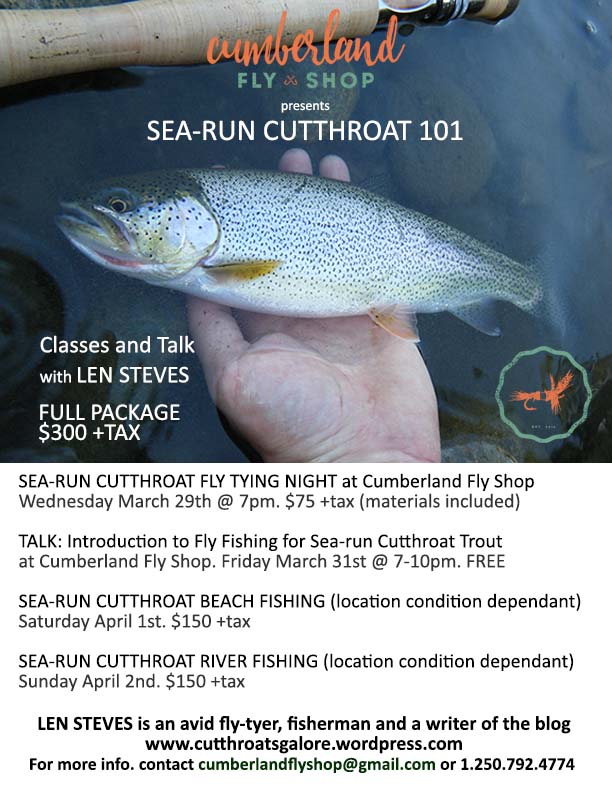There has been a lot of uproar about invasive species in BC in recent years, and indeed it is a topic that seems to get a lot of people frothing at the mouth, not unlike go pro cameras, Instagram etc. There are many places where invasive species don’t belong and their spread should be halted (bullfrogs come to mind), but I refuse to let such foolish and self destructive obstinacy rule my mind when it comes to the clear path of the destruction of our truly amazing salmonids.
While I agree that invasive species like pike in the Kootenays have the potential to do serious damage to ecosystems, just like silver carp in the Great Lakes, perch on the island and many others, let’s be clear that smallmouth bass have been on Vancouver island for a very long time. Bass have been in the Okanagan again for a long time and I do mean a long time. Many of these places have valid and strong fisheries where invasive species impacts have long ago balanced out. There is better rainbow trout fishing in Vaseaux lake in the Okanagan than any lake on Vancouver island and it has largemouth, smallmouth, perch, and other invasive spiny ray species. The decline of sockeye salmon to these same waters has a lot more to do with the several dozen dams that stand between the ocean and the upper tributaries of the Columbia river, coupled with water that now warms to deadly temperatures in the Columbia prior to the sockeye even reaching the Okanagan, again which has little to do with invasive species.
This fishery is an example of an adapted fishery in the reality of today’s changing climate that requires little input, and are set to adapt to what sure seems to be a changing climate. So before you howl with self righteous fury let’s deal with the facts on where these species interact with salmonids.
There are very little salmon or steelhead left comparable to the recent past in places like the Gold, Stamp, Cowichan or Salmon river(VI), nor in the Dean, Thompson, Chilcotin, the Samish, Skykomish, Skagit, Deer creek, and indeed a great many other places famous for their salmon or steelhead. Where is the impact from invasive species to any of these places? Minimal to nonexistent, humans have been continuously and self righteously used the “manage to zero” philosophy to manage the salmonids all up and down the coast, and between selfish sport fisherman, commercial fisherman, cynical native management and the whole phalanx of government institutions that basically enforce systematic ocean rape, have left the populations of salmonids in tatters. Even as I was growing up the canneries and much of the commercial fisheries like the huge salmon biomass in the ocean that sustained them, were already gone. Resident Georgia straight coho, once a fishery unto themselves were already in steep decline. The Invasive species that everyone was worried about when I was a kid were mackerel and humboldt squid, but I think the real problem lies a little closer to home.
Let me make it clear, I will support bass culls when you support brown trout kill fisheries on the Cowichan, little Qualicum, Eve and the many other lakes and streams that have them here. Chinook, pink and other salmon have also been planted repeatedly in places they had never existed before by humans to create fisheries. Same goes for brook trout and the elephant in the room rainbow trout. There are so many places where rainbow trout have severely impacted native coastal cutthroat and other native trout, but nobody is willing to even consider that impact. All I am saying is that the only rationale used for these stockings is for the purpose of creating fisheries. If you truly believe with such ardour that bass should be removed from warm lakes stocked with hatchery rainbows, then you should equally look with disdain at those sought after big cowichan Browns who have undoubtedly severely impacted coastal cutthroat and rainbow and other salmonid populations in the river. If you disagree with that you are a hypocrite.
The Salmon river on Vancouver island will probably have 100 winter steelhead tops this season and yet is (a) open for some inexplicable reason (where is your outrage?) and (b) getting pounded on daily as if Instagram is in desperate need of horrible 4 feet out of the water grip and grin photos. There are so many things wrong with this situation none of which have anything to do with invasive species and yet you get angry about smallmouth bass in elk lake?
Focus on the real drivers of oceanic and freshwater impacts on salmonids, which are singularly all human for profit industries, coupled with an unfriendly change in climactic effects, and governments of the day who now have in place the tools and mandate to manage coastal salmonid stocks into extinction, not species that represent in some cases the only truly strong “wild” fisheries that will remain now and into the future.
